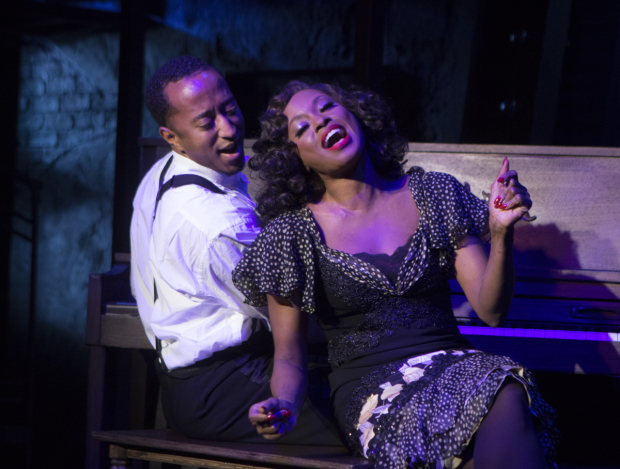
(© Christopher Mueller)
If the sweltering days of August are getting to you, head over to Signature Theatre and revive yourself with the cool, refreshing strains of Jelly's Last Jam in a sensational regional premiere. Written by George C. Wolfe, using music by Jelly Roll Morton, lyrics by Susan Birkenhead, and additional music by Luther Henderson, the show is brimming with Morton's inspired music and paired with exceptional tap dancing to tell the story of the man who first notated jazz.
A classically trained pianist, Ferdinand Joseph LaMothe (a.k.a. Jelly Roll Morton), was born in 1890 to a middle-class Creole family in New Orleans. He absorbed the growing jazz sounds around him, but was banished from his home by his strict grandmother when she found out that he was mingling with the "lower" classes. After leaving home, Morton worked as a stride pianist, incorporating into his music everything from ragtime to blues. He came to be known as the first arranger of jazz, but arrogantly self-proclaimed that he "invented jazz."
Jelly's Last Jam documents how Morton's oversize ego destroyed him. The musical opens near the end of his life, when he is confronted by "Chimney Man," a conscience-like figure who serves to show Morton the mistakes he has made throughout his life: losing the one woman he loved, humiliating the one man who was his friend, and refusing to acknowledge his African-American roots.
The biggest asset of this production is first-rate pianist Mark G. Meadows who stars as Morton (and to whom Morton's difficult riffs and trills are child's play). Meadows handily demonstrates Morton's electifying, singular style. Equally important, Meadows is a gifted actor, who beautifully illuminates Morton's complex personality.
Chimney Man is powerfully portrayed by Cleavant Derricks, who acts as a master of ceremonies or, as he explains to Morton, "the concierge of your soul." Elijah Mayo is impressive as Young Jelly, who plays the musician as a young man, sneaking out of that uncompromising household to hear the wilder sounds of the city.
Felicia Boswell is excellent as Anita, the singer and club owner in New Orleans who falls in love with Morton when she hires him to play the piano for her. Boswell's voice is crystal clear. There is a credible chemistry between her and Morton. Nova Y. Payton provides a standout performance as Miss Mamie, one of the characters in Morton's early life. A song she sings with Buddy Bolden (the excellent V. Savoy McIlwain), "Michigan Water," is one of the best musical numbers of Act 1.
Iyona Blake is a towering figure as the threatening grandmother, Gran Mimi, who proves just by her presence why Morton could never go home again. Guy Lockard is well cast as the jovial Jack, Morton's one friend, who would do anything for him and whom Morton savagely betrays.
Darius Smith leads a vibrant orchestra of six musicians who sit on a balcony above the stage. Daniel Conway's set is designed to be the Jungle Inn, a club where Morton played. On the floor in front of the elevated stage, small tables and chairs are arranged as they would be in a club. There is an upright piano at the back of the stage and another piano rises from under the stage apron. Since the play begins in the 1920s, costume designer Dede Ayite dresses the female dancers as flappers, while the men wear '20s street garb.
While Jelly's Last Jam is not a perfect musical — Act 1 is much stronger than Act 2 — it is skillfully directed by Matthew Gardiner and smoothly choreographed by Jared Grimes. This production provides a piercing look at the arrogant, brilliant man who did so much to document early jazz. Yet it is far more than a bio-drama. It is also an account of the black popular music scene in the early 19th century, and it sheds some light on what being black in that era was like. The combination of Morton's inimitable music, stunningly executed tap dancing, and an inside look at the early American jazz scene makes Jelly's Last Jam a summer show you don't want to miss.









